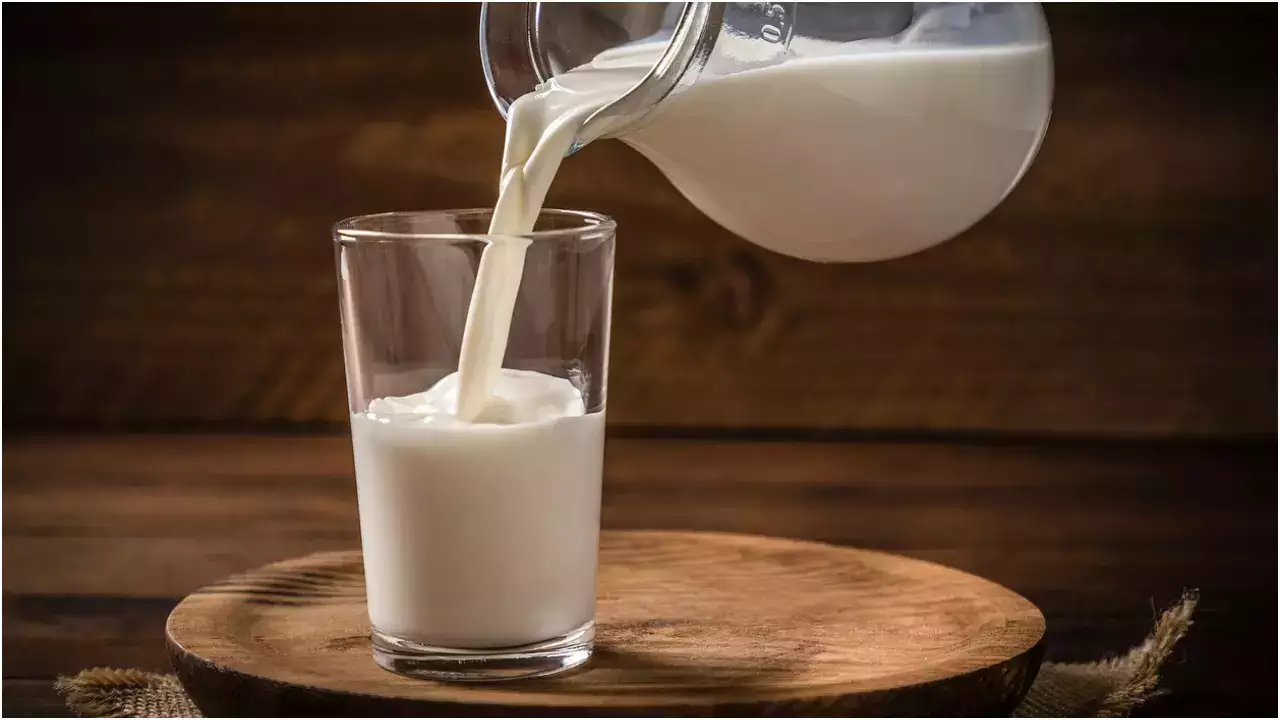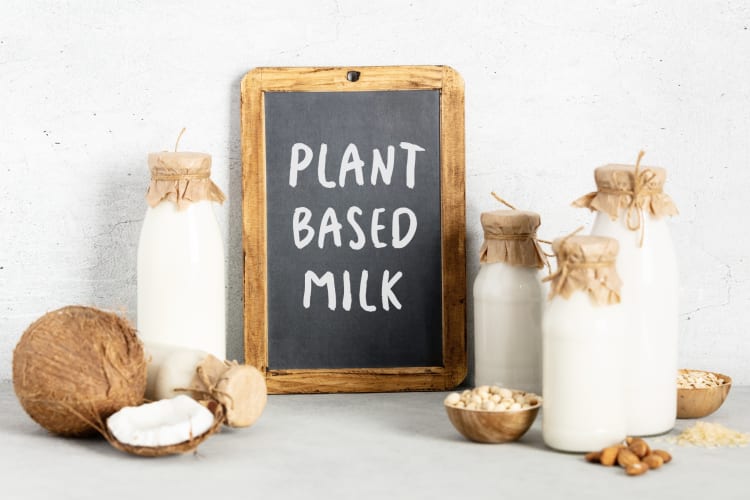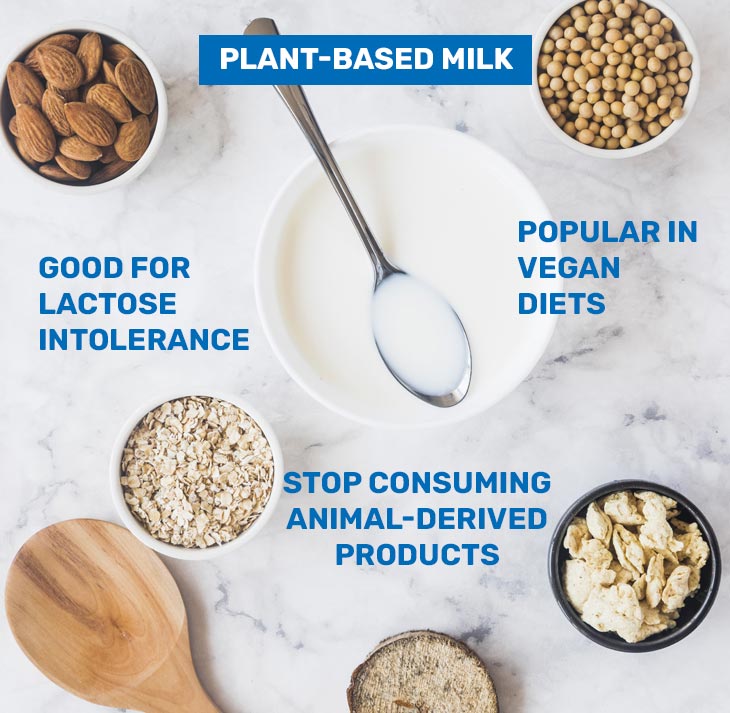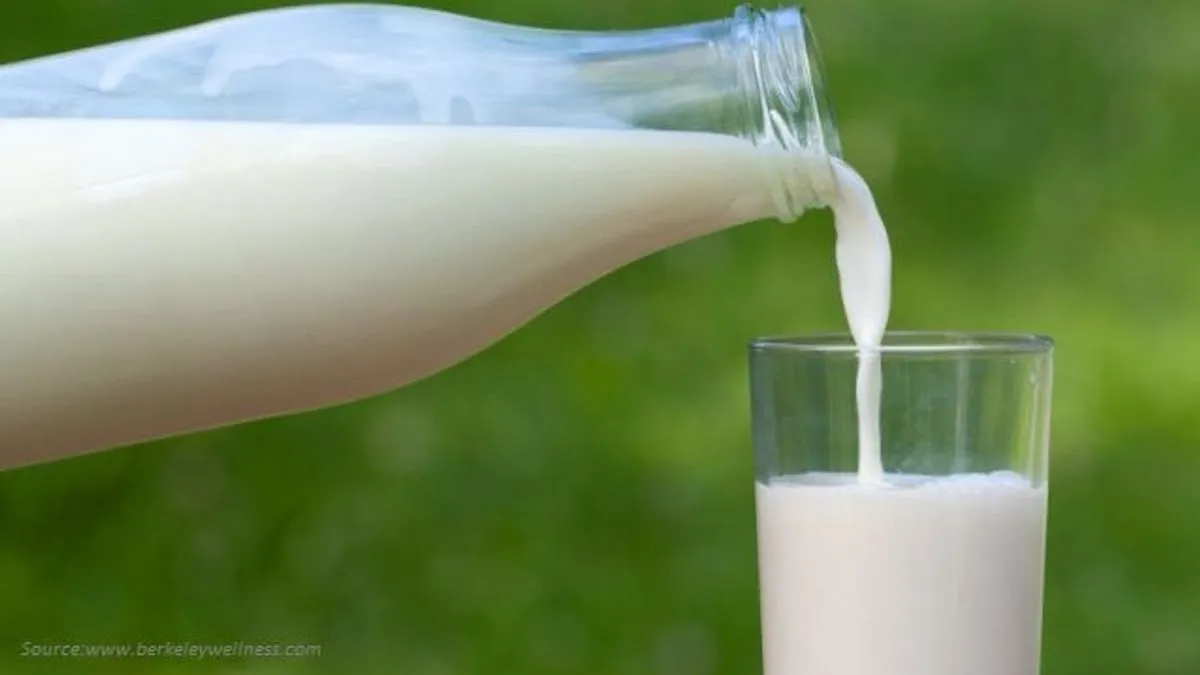Milk: -
Milk is the base for all dairy products. Milk can be consumed directly or processed into other items. Milk is the basic need of every human being when a child get birth so for 1 to 1.5 years their basic need is milk and even their first meal is the milk. There are numerous provenances from where we can achieve our requirements which means there are many animals that give us milk and every animal's milk is different from the other each milk has its own unique taste, feature, texture, color and many other things also. Milk is a rich source of calcium, proteins vitamins and minerals which is very beneficial for human body.
Types of Milk: -
There are basically three types of milk available to us that are beneficial for our body and bone health. The types of milk are explained below: -
I. Animal Based Milk: -
Animal-based milk is a type of milk that we get from different types of animals. Animal based milk is a nutrient-rich fluid that can be manufactured by the mammary glands of mammals to nourish their young ones. This milk is also consumed by humans in various forms and is commonly derived from animals such as cows, buffaloes, goats, sheep, and camels. This milk is very high in vitamins which naturally holds proteins, fats, carbohydrates (mainly lactose), vitamins, and minerals that are important for human germination and magnification.
Health Benefits of Animal-Based Milk: -
1. Bone Health: -
- Animal based milk is very rich in calcium, phosphorus, and vitamin D which help to strengthen the bones and to prevent osteoporosis.
2. Muscle Growth and Repair: -
- Animal milk has high-quality proteins (casein and whey) that support our muscle repair and growth and help us to keep fit and healthy.
3. Immune System Support: -
- This milk also holds vitamin B12, zinc, and selenium that are aid of immune function. Basically, this type of milk is used to improve our immune system.
4. Energy Boost: -
- Animal based milk has natural fats and sugars (lactose) in the milk that provide us quick and sustained energy. Animal based milk is also considered to as energy booster because animal milk contains the type of vitamins that give energy to our bones and our body healthy.
5. Heart and Brain Health: -
- Animal milk also attains omega-3 fatty acids (especially in grass-fed and sheep/goat milk) that brace brain and cardiovascular function due to which our brain can do their work very efficiently.
6. Hydration and Electrolyte Balance: -
- Animal based milk holds electrolytes like potassium, magnesium, and sodium in their milk which is very essential and important for the development and overall functioning of the human body.
Uses of Animal-Based Milk: -
1. Beverages: -
- Animal based milk can be consumed directly as whole, toned, or skimmed milk or can get mixed with any flavor to enhance the taste of the milk.
- This milk is also used to make tea, coffee, milkshakes, and smoothies.)
2. Cooking & Baking: -
- Thus, milk is also used to make soups, sauces, desserts, and to baked goods to give richness and texture to the particular dish.
3. Dairy Products: -
- Animal milk can also be used in dairy products where milk can be processed or coverted into cheese, yogurt, butter, ghee, cream, and condensed milk.
4. Infant and Elderly Nutrition: -
- Animal milk can also be sed in formula milk for babies and in diets for seniors needing high-nutrient food.
5. Cultural and Religious Practices: -
- Integral to rituals and festivals, especially in many Indian and Middle Eastern cultures.
Plant-based milk is a dairy-free alternative constructed by extricating the plant material (such as nuts, seeds, grains, or legumes) and blending all that material with water. These milk granules are often used by individuals who are lactose intolerant, vegan, allergic to dairy, or looking for more sustainable and lower-fat options. Common examples include soy milk, almond milk, oat milk, coconut milk, and rice milk.
Health Benefits of Plant-Based Milk: -
1. Lactose-Free: -
- Plant based milk is naturally free from lactose that making it suitable for the people with lactose intolerance or milk allergies. Basically, this milk can fit for everyone including those people who are vegan free and lactose intolerant.
2. Lower in Calories and Fat: -
- Most of the plant-based milks are lower in saturated fat and calories in compared to whole dairy milk.
3. Heart Health: -
- Plant based milk contains wide varieties like almond, oat, and hemp milk that contain unsaturated fats and omega fatty acids, which support cardiovascular health.
4. Rich in Vitamins and Minerals: -
- It often fortified with calcium, vitamin D, B12, and iron to match or exceed the nutrient profile of cow’s milk.
5. High in Antioxidants: -
- Some types (like almond and cashew milk) contain vitamin E and polyphenols that protect against oxidative stress.
6. Digestive Support: -
- As there is a wide variety of plant-based milks are available to us so from plant-based milk oats milks are very beneficial that support our digestion system.
7. Weight Management: -
- As plant-based milk are very from animals and free from vegan so these types of milk are low in calories, so it is very helpful in maintaining the weight.
Uses of Plant-Based Milk: -
- Plant based milk can consumed directly or can be used in smoothies, protein shakes, and flavored drinks.
2. Coffee and Tea: -
- As we know coffee and tea is the very basic drink that are mostly liked by many people so plant-based milk is very useful in making tea and coffee in various restaurants.
3. Cooking and Baking: -
- It also used in soups, sauces, cakes, pancakes, and vegan recipes as a milk replacement.
4. Cereal and Porridge: -
- This type of milk is idea breakfast bowls that we can consumed with oats, cornflakes, or granola.
5. Desserts: -
- Plant based milk can mostly use in ice creams, puddings, custards, and vegan sweets.
6. Special Diets: -
- Plant based milk is very essential in vegan, paleo, and plant-based diets as a nutritious dairy alternative.
Pasteurized milk is a type of milk that has been heat-treated to kill harmful bacteria and pathogens without significantly affecting its taste or nutritional value. Pasteurized milk has long shelf life, and it does not get spoiled in short period of time. So having its shelf life longer it helps to keep the nutrients, proteins l, vitamins and minerals of the milk active for longer time. The process of heating the milk to that extent that it does not get spoiled is called pasteurization. This method was developed by Louis Pasteur to increase the safety and shelf life of milk and prevent the milk from spoilage.
Pasteurized milk is a special type of milk because it undergoes controlled processing to make it safer for consumption, especially compared to raw (unprocessed) milk.
Health Benefits of Pasteurized Milk: -
1. Safe for Consumption: -
- Pasteurization of the milk destroys all the harmful bacteria of the milk such as Salmonella, Listeria, and E. coli that preventing us from foodborne illnesses.
2. Extended Shelf Life: -
- This type of milk can last longer than raw milk when refrigerated properly and helps in reducing waste.
3. Preserves Nutrients: -
- It retains most of the original protein, calcium, vitamin D, and B vitamins of the milk by making it nutritionally beneficial.
4. Digestive Safety: -
- It also reduces the risk of gastrointestinal infections. This type of milk is very important and beneficial for everyone especially important for infants, elderly, and people with weak immunity.
5. Quality Controlled: -
- It often monitored and standardized for fat content, cleanliness, and nutrient fortification (e.g., with vitamin D).
Uses of Pasteurized Milk: -
1. Direct Consumption: -
- We can straightly gobble the pasteurized milk because this milk is authentic and very nourished when we consumed it even in its raw form.
2. Tea and Coffee: -
- Pasteurized milk can used largely in hot beverages and many types of hot drinks because of its safety and easy availability.
3. Cooking and Baking: -
- This type of milk is perfect for making soups, sauces, puddings, cakes, and custards because this type of milk is condensed in nature and is on sweeter side due to which its thick consistency is very helpful in the making if these types of dishes.
4. Dairy Products: -
- Pasteurized milk can be pre-owned in the manufacturing of cheese, yogurt, ghee, butter, and ice cream because pasteurized milk is more adequated and superior to make ice cream, butter and yogurt rather than raw milk.
5. Infant and Medical Diets: -
- Pasteurized milk can mostly refer in infant formulas and dietary plans for patients due to its hygienic quality.










.jpeg)




0 Comments